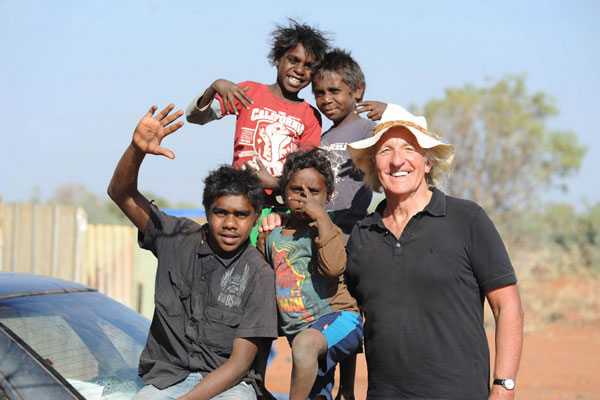Its uncomfortable truths may have sparked mixed reviews in the home country, but acclaim over John Pilger’s Utopia is growing internationally, with positive early feedback from Native American academics, who label the film “brutal”, “unsettling” and “powerful”.
Utopia is the veteran journalist’s fourth film on Aboriginal Australia. It chronicles the underlying racism in Australian society and how the history of dispossession and displacement has left First Nations people in poverty and disadvantage.
It aims to demolish the great Australian silence on the frontier wars; unravels the lies and media manipulation that paved the way for government to implement the NT intervention; unveils the new Stolen Generations as child protection services take away worrying numbers of Aboriginal children; and pays respect to unknown heroes like Arthur Murray, Rosie Kunoth-Monks and Robert Eggington.
While Utopia received almost unanimous positive reviews after it premiered in the UK, when it hit Australian shores, the reception was mixed, even muted, although there were hundreds of community screenings across the country.
Australia’s failure to raise Aboriginal equality remains a dark blot on its international reputation, as shown in numerous reports from the United Nations.
Australia remains the only western nation to refuse a treaty with its First Peoples, and it has the highest life expectancy gap out of the four western nations with large Indigenous populations (the United States, Canada and New Zealand).
But early reviews in America and Canada by First Nations academics and experts have praised the film for lifting a lid on the disturbing truths within Australia, suggesting that international pressure is growing.
Professor and Chair of Regional Innovation at the University of Saskatchewan, Ken Coates called Utopia “brutal and fabulous”.
“Utopia presents a portrait of Australia’s past and present that few will be comfortable seeing but that all are duty bound to confront,” Prof Coates said.
“In a simple, graphic and effective manner, this documentary recounts the historical processes and describes the contemporary realities of Aboriginal people.
“The account is disturbing, all the more because the filmmaker has simply held a mirror up in front of Australia, allowing the country to see the grotesque injustices of Aborigines living poor in the midst of the ‘Lucky Country’.”
Professor and Chair of Native American Studies at Dartmouth College N. Bruce Duthu called Utopia “compelling, gripping and unsettling”.
“The images of sub-standard living conditions, abusive police practices, and dismal health standards are a powerful reminder of the legacy of colonialism and misguided government policies.
“Any measure of hope, according to the Indigenous voices in this film, can only come through respectful, active engagement with Indigenous communities. This is a ‘must see’ film for anyone interested in achieving justice for Indigenous peoples.”

Professor Emeritus of Cultural Anthropology at Washington State University John H. Bodley wrote that he would be showing the film to his students.
“These scenes are vivid metaphors for the national denial of the large reality that Aborigines remain ‘refugees in our own country’,” Prof Bodley wrote.
“Utopia portrays the up-close and personal impacts of deplorable poverty, preventable blindness, suicide, death in ‘protective’ custody, and loss of land to destructive mining still suffered by Aboriginal people throughout Australia.
“The extensive analysis of the misleading basis for the recent military-police ‘Intervention’ in the Northern Territory is especially timely.
“This film makes a powerful case for a genuine Treaty between Aborigines and the federal government to end the injustices that have afflicted Australia’s First Nations since European colonization began in 1788.”
Yesterday, advocacy group Concerned Australians launched a new video campaign to reinvigorate calls for treaty.
* Amy McQuire was a researcher on Utopia. Chris Graham, the owner and editor of New Matilda, was an Associate Producer on Utopia.
Donate To New Matilda
New Matilda is a small, independent media outlet. We survive through reader contributions, and never losing a lawsuit. If you got something from this article, giving something back helps us to continue speaking truth to power. Every little bit counts.



